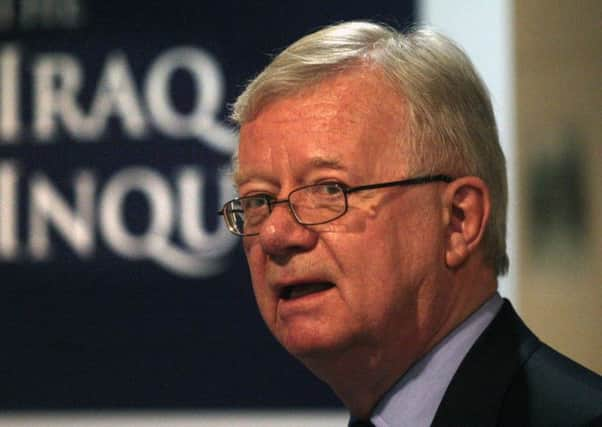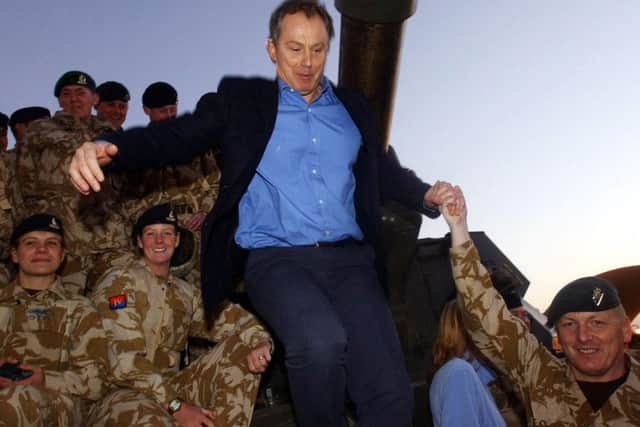Chilcot delays Iraq War inquiry publication to next summer


Sir John Chilcot announced earlier that his team expects to complete the text of its two million word report by the week commencing April 18 and aims to publish it by June or July 2016.
But in a letter to the inquiry chairman, the Prime Minister said the families of those who served in Iraq would share his disappointment at the timescale.
Advertisement
Hide AdAdvertisement
Hide AdHe wrote: “I recognise that you have a significant task, but would welcome any further steps you can take to expedite the final stages of the inquiry.”
Sir John said the report would be made available to officials for “national security checking” and preparation for publication once it is completed.
The process is required to ensure the Government’s obligations under the European Convention on Human Rights and the protection of UK national security “will not inadvertently be breached by publication of the inquiry’s report as a whole”, he said.
Advertisement
Hide AdAdvertisement
Hide AdBut the Prime Minister pointed out the Saville Inquiry into Bloody Sunday took just two weeks to complete and said he expected the process for the Iraq report to “take no longer than this”.


He added: “Whilst it is welcome of course that there is now a clear end in sight for your inquiry, I am disappointed - and I know the families of those who served in Iraq will also be disappointed - that you do not believe it will be possible logistically to publish your report until early summer.”
Tony Blair, who ordered the original invasion of Iraq in 2003, appeared before the inquiry twice.
Although the probe looked at the entire period of British operations in Iraq, much of the focus has been on the decision to overthrow Saddam Hussein.
Advertisement
Hide AdAdvertisement
Hide AdSir John, however, has always said he would not deliver a verdict on whether the conflict was lawful or not.
Critics have claimed Mr Blair is partly responsible for the delays in publication through the Maxwellisation process that gives witnesses a chance to respond to criticism before the findings are released - a claim the former prime minister has again strongly denied.
A spokesman for Mr Blair said: “Tony Blair has always wanted the inquiry to report as soon as it properly can and he looks forward to responding to the inquiry’s report.
“Mr Blair also wants to make it clear that the timetable of the inquiry and the length of time it will have taken to report is not the result either of issues over the correspondence between him as Prime Minister and (US) President Bush, or due to the Maxwellisation process.
Advertisement
Hide AdAdvertisement
Hide Ad“As for the first, the correspondence has been with the inquiry from the beginning. The only question was over how much of the correspondence could be published in the final report, not about its content being used to inform the report. In any event that question was resolved between the Cabinet Office and the inquiry in May 2014.
“Secondly, Tony Blair received the deliberations of the inquiry under the Maxwell process in full only in January 2015, four years after the inquiry finished taking evidence. He responded by August. This is not therefore the reason for the delay, as Sir John Chilcot has made clear.
“It is our understanding that other witnesses also received information very late in the process, so any suggestion that witnesses have been the cause of the delay is categorically incorrect and this has again been stated clearly and publicly by Sir John.”
The announcement of a timescale for publication comes amid increasing frustration among politicians and the families of service personnel who lost their lives in the conflict at the long delay in completing the report.
Advertisement
Hide AdAdvertisement
Hide AdMr Cameron has previously described the hold-ups - which mean it should finally be released some seven years after the inquiry was first launched - as “extremely frustrating”.
Sir John has blamed a lengthy dispute with the Civil Service over the declassification of official documents as well as a need to give individuals facing criticism the chance to respond.
The “lessons learned” inquiry was first announced by then prime minister Gordon Brown in June 2009 and began public hearings in November of that year.
In the course of the inquiry, it took evidence from politicians, generals, civil servants and intelligence chiefs.
KEY DATES IN THE SAGA:
• 2009
Advertisement
Hide AdAdvertisement
Hide AdJune 15: Prime Minister Gordon Brown announces that a panel of privy councillors led by Sir John Chilcot will conduct an inquiry of ‘’unprecedented’’ scope, covering the lead up to the invasion from summer 2001 to the withdrawal of the main body of British troops earlier that year.
Amid cries of an “establishment stitch-up”, he is forced into rapid U-turns over his initial insistence that it had to be held behind closed doors and would not apportion blame.
July 30: Sir John says late 2010 is ‘’probably the earliest possible’’ date for his report to be published.
November 11: The first public hearings take place.
• 2010
January 29: Tony Blair makes his long-awaited appearance before the inquiry and insists he did not go to war on the basis of a “lie”, has no regrets over removing Saddam Hussein and would do the same again. Audience members shout “liar” and “murderer” as he leaves.
Advertisement
Hide AdAdvertisement
Hide AdMarch 5: Prime Minister Gordon Brown defends his decision to curb defence spending after the Iraq invasion and tells the inquiry he provided money every time defence chiefs asked for new equipment. Days later he admits he was wrong to claim the defence budget had risen in real terms every year under Labour and will clarify his evidence.
June 29: Hearings resume after being halted for the general election campaign, which saw Labour lose power and the Conservatives and Liberal Democrats form a coalition.
• 2011
January 18: Sir John says he is “disappointed” the head of the civil service, Cabinet Secretary Sir Gus O’Donnell, is blocking the publication of secret messages sent by Tony Blair to George Bush which Sir John says are “central” to the inquiry’s considerations.
February 2: Former foreign secretary Jack Straw’s evidence marks the inquiry’s final public hearing.
Advertisement
Hide AdAdvertisement
Hide AdNovember 17: The Iraq Inquiry says its report will be delayed by six months because of wrangling over the release of secret documents.
• 2012
July 16: Sir John writes to David Cameron alerting him to a further delay and revealing letters to people who were set to be criticised would not start to be sent until the middle of 2013.
• 2014
May 16: Mr Cameron says he is frustrated by delays, but hopes the report will be published by the end of the year.
May 29: It is agreed details of conversations between Tony Blair and George Bush will be published.
• 2015
Advertisement
Hide AdAdvertisement
Hide AdAugust 13: Families of soldiers killed in the Iraq War threaten legal action if a publication date for the report is not set within two weeks.
August 15: Prime Minister David Cameron tells Sir John to “get on with it” and said delays are “immensely frustrating”.
August 26: In the face of mounting criticism over delays in publishing the report, Sir John issues a statement saying he understands “the anguish of the families of those who lost their lives in the conflict”, but adds “it is critically important that the report should be fair”.
October 22: The Government rejects calls to dismiss the Chilcot inquiry team and produce an interim report. Cabinet Office minister Lord Bridges of Headley warns that such a move would “undermine the fundamental independence” of the long-delayed inquiry.
Advertisement
Hide AdAdvertisement
Hide AdOctober 25: Mr Blair apologises for aspects of the Iraq War, sparking claims of attempted “spin” ahead of the Chilcot Inquiry findings. The former prime minister uses a US television interview to express regret over the failure to plan properly for the aftermath of the 2003 toppling of Saddam Hussein and the false intelligence used to justify it.
October 29: Sir John announces the report should be published by July next year, although it ought to be completed by April 18 and presented privately for security checking.